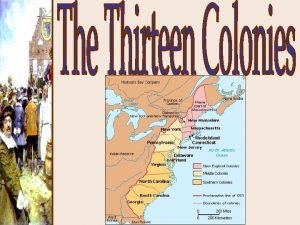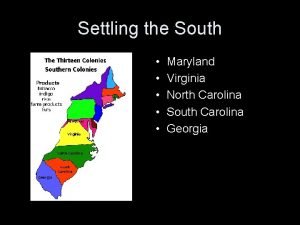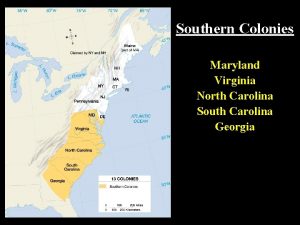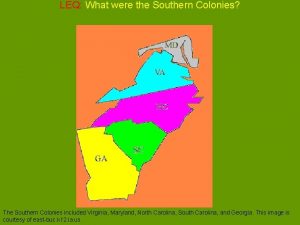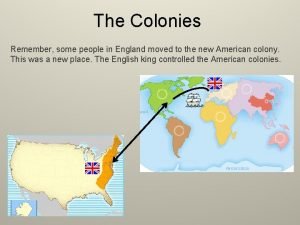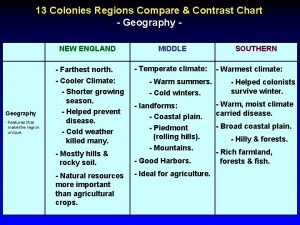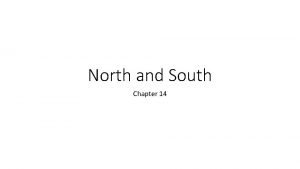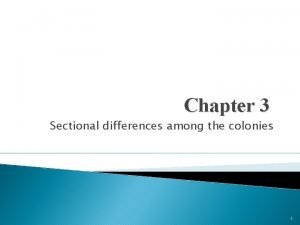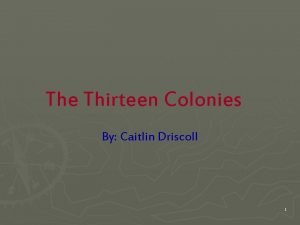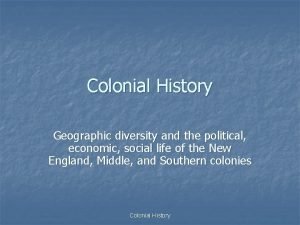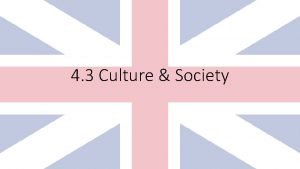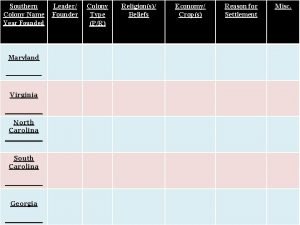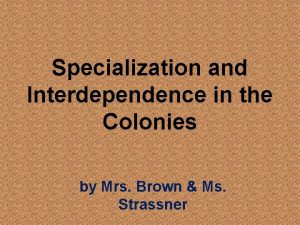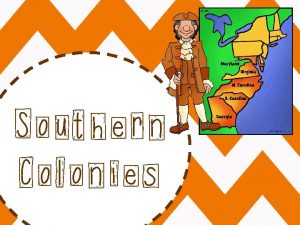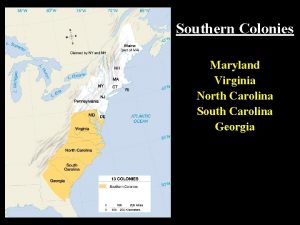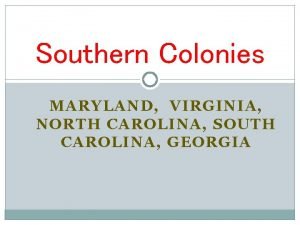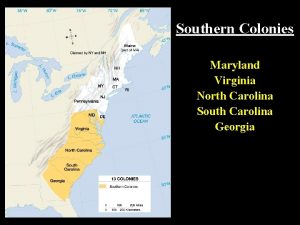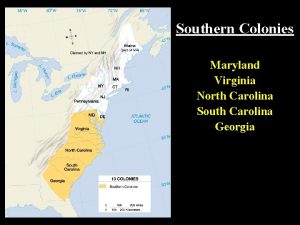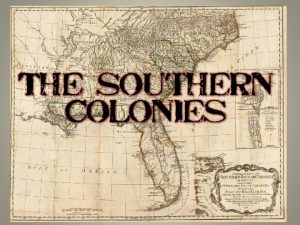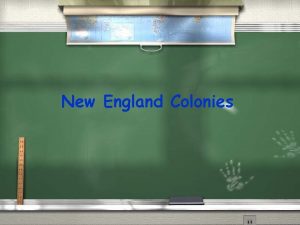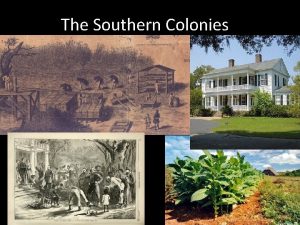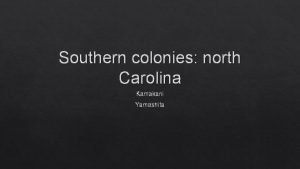Southern Colonies Maryland Virginia North Carolina South Carolina














- Slides: 14

Southern Colonies Maryland Virginia North Carolina South Carolina Georgia

Chesapeake Colonies • Maryland • Virginia • Still part of the Southern Colonies

Southern Colonies s. colonies 1. Indentured servants 2. slavery to work the large plantations 3. rice, tobacco and cotton 4. fertile soil 5. cities: Charleston, Savannah & Baltimore Maryland Virginia North Carolina South Carolina Georgia


Colony/Date Virginia---1607 • Jamestown Maryland--1634 Person Responsible Joint Stock Company Virginia Company Captain John Smith John Rolfe Lord Baltimore John Locke North/South Carolina In 1663 Georgia— 1732 8 English nobles James Oglethorpe Why Founded Attract new settlers for Dutch and Swedish colonists Governed/Owner Representative Govt • House of Burgesses Royal Colony Religious toleration— those who believed in Christ---allowed persecuted Catholics to settle in Maryland Representative govt Setup a new colony based upon social classes…Failed and divided into 2 parts Representative govt Provide a place for debtors could start a new life---Acted as a buffer against Spanish Florida Proprietary Colony Royal Colony

Population of Chesapeake Colonies: 1610 -1750

George Calvert, Lord Baltimore

Colonization of Maryland

Restoration Colonies • Restoration refers to the restoration to power of an English monarch, Charles II, in 1660 following a brief period of Puritan rule under Oliver Cromwell – Carolinas, Georgia, New York, New Jersey, Pennsylvania, Delaware

The Carolinas • As a reward for helping him gain the throne, Charles II granted a huge tract of land between VA and Spanish Florida to 8 nobles in 1663 • The original proprietorship was broken into 2 royal colonies in 1729

Settling South Carolina • Charles town was formed in 1670 by a few colonists from England some planters from the island of Barbados • Initially, the economy was based on trading furs and providing food for the West Indies • By the middle of the 18 th century, large rice-growing plantations worked by African slaves created an economy and culture that resembled the West Indies

• Although Carolina was geographically closer to the Chesapeake colonies, it was culturally closer to the West Indies in the seventeenth century since its early settlers— both blacks and whites— came from Barbados. • South Carolina retained close ties to the West Indies for more than a century, long after many of its subsequent settlers came from England, Ireland, France, and elsewhere.

Democratic North Carolina • Farmers from VA and New England established small, self-sufficient tobacco farms • Region had few good harbors and poor transportation so there were fewer large plantations and less reliance on slavery • By the 18 th century, the colony earned a reputation for democratic views and autonomy from British control

Georgia – The Last Colony • A proprietary colony and the only colony to receive direct financial support from the home government in London • Set up for 2 reasons – Defensive buffer – Rid England’s overcrowded jails of debtors • Special Regulations – Absolute ban on drinking rum – Prohibition of slavery • Colony did not thrive because of the constant threat of Spanish attack • Taken over by the British government in 1752 when Oglethorpe and his group gave up – Bans on slavery and rum dropped – Colony grew slowly by adopting the plantation system of South Carolina
 Virginia, maryland, north carolina, south carolina, georgia
Virginia, maryland, north carolina, south carolina, georgia Maryland virginia north and south carolina and georgia
Maryland virginia north and south carolina and georgia Virginia, maryland, north carolina, south carolina, georgia
Virginia, maryland, north carolina, south carolina, georgia What is this image
What is this image Site:slidetodoc.com
Site:slidetodoc.com Compare and contrast 13 colonies
Compare and contrast 13 colonies North and south lesson 3 southern cotton kingdom
North and south lesson 3 southern cotton kingdom New england colonies definition
New england colonies definition Economy of southern colonies
Economy of southern colonies Caitlin driscoll
Caitlin driscoll New england mid atlantic and southern colonies
New england mid atlantic and southern colonies Southern colonies geography
Southern colonies geography Southern colonies society/culture
Southern colonies society/culture Southern colonies founder
Southern colonies founder Southern colonies specialization
Southern colonies specialization
